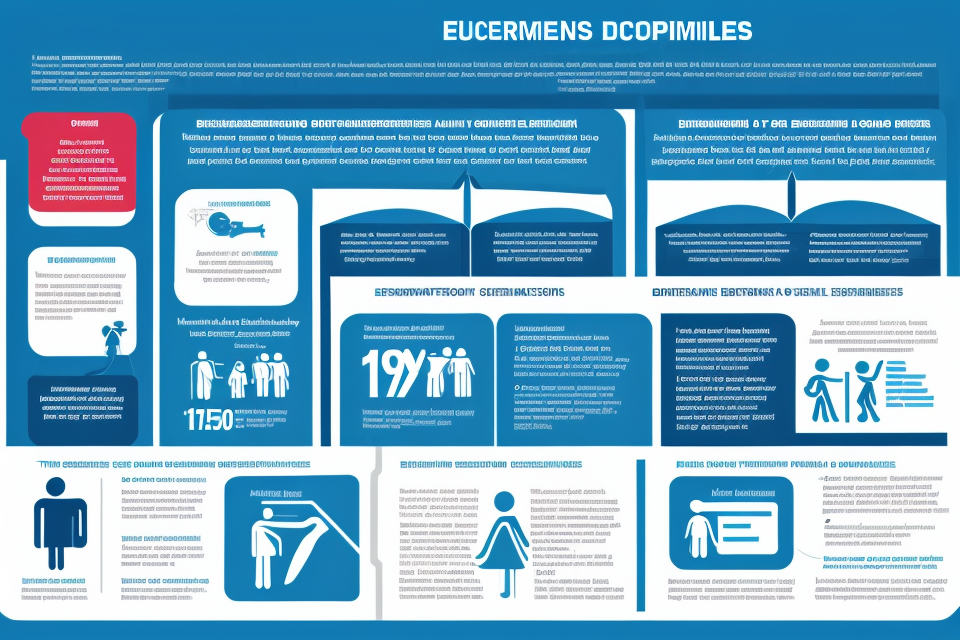
Are you struggling to keep up with the ever-changing landscape of department regulations? As a business owner or professional, it’s crucial to stay informed and compliant with the latest rules and requirements. But with so many sources of information available, where do you even start? In this article, we’ll explore some tips and strategies for easily accessing and understanding department regulations. From government websites to industry associations, we’ll cover the resources you need to stay ahead of the game. So, let’s dive in and discover how you can navigate the world of department regulations with ease.
To easily access and understand department regulations, start by checking your company’s intranet or employee handbook for a copy of the regulations. If you cannot find them there, try asking your supervisor or human resources department for a copy. It may also be helpful to review the regulations with a coworker or supervisor to ensure you understand them correctly. Additionally, consider taking notes while reviewing the regulations and highlighting any key points or areas of confusion. Finally, be sure to review the regulations periodically to ensure you are staying up-to-date on any changes or updates.
Where to Find Department Regulations
Department regulations can be found in various sources, depending on the level of government and the specific department. Here are some of the most common places to find department regulations:
Federal Regulations
The federal government has several sources for regulations, including the Federal Register and the Code of Federal Regulations (CFR).
Federal Register
The Federal Register is the official daily publication for rules, proposed rules, and notices of meetings. It is published by the Office of the Federal Register, which is part of the National Archives and Records Administration. The Federal Register contains a variety of documents, including final rules, proposed rules, notices of meetings, and presidential documents. It is updated daily and is available online or in print.
Code of Federal Regulations (CFR)
The Code of Federal Regulations (CFR) is a comprehensive annual compilation of federal regulations. It is organized into 50 titles, each of which covers a specific area of regulation. The CFR is updated annually and is available online or in print. It is a useful resource for researching federal regulations and understanding how they are organized.
State Regulations
State regulations can be found in several sources, including the state administrative agency, the state register, and the state code of regulations.
State Administrative Agency
The state administrative agency is responsible for developing and enforcing state regulations. This agency may be called different names in different states, but it is typically responsible for overseeing a wide range of activities, including business licensing, environmental protection, and consumer protection. The state administrative agency may also be responsible for enforcing specific regulations, such as workplace safety regulations or building codes.
State Register
The state register is the official publication for state regulations, proposed rules, and notices of meetings. It is typically published by the state administrative agency and is updated regularly. The state register may be available online or in print, and it is a useful resource for researching state regulations and understanding how they are organized.
State Code of Regulations
The state code of regulations is a comprehensive annual compilation of state regulations. It is organized into different titles or chapters, depending on the state. The state code of regulations is typically updated annually and is available online or in print. It is a useful resource for researching state regulations and understanding how they are organized.
How to Access and Understand Department Regulations
Research and Analysis
Identify the regulating department
- The first step in accessing and understanding department regulations is to identify the department responsible for the regulations you need. This may involve researching the relevant government agency or department that oversees the industry or sector you operate in.
- It is important to note that regulations may be enforced by multiple departments, so it is important to research and identify all relevant departments before proceeding.
Identify the specific regulation
- Once you have identified the regulating department, the next step is to locate the specific regulation or regulations you need. This may involve reviewing the department’s website or contacting them directly for information.
- It is important to have a clear understanding of the specific regulation you are researching, as this will help you to focus your research and analysis.
Research
- Research is a crucial step in accessing and understanding department regulations. This may involve searching for information on the regulation, including its purpose, scope, and requirements.
- There are a variety of resources available for researching department regulations, including official government websites, industry associations, and academic databases.
Analyze
- After researching the regulation, it is important to analyze its implications for your business or organization. This may involve considering how the regulation affects your operations, as well as any potential costs or benefits associated with compliance.
- It is important to have a clear understanding of the regulation before attempting to analyze its implications, as this will help you to make informed decisions about compliance.
Understanding Department Regulations
Importance of Understanding Regulations
- Legal Compliance: It is essential to understand department regulations to ensure that your business or organization is operating within the law. Failure to comply with regulations can result in legal consequences, such as fines or even shutdowns.
- Avoiding Penalties: Understanding department regulations can help you avoid fines, sanctions, and other penalties for non-compliance. By knowing what is required of you, you can take steps to meet those requirements and avoid potential penalties.
- Protecting Your Business: Regulations are put in place to protect consumers, workers, and the environment. Understanding the regulations that affect your industry can help you identify potential risks and take steps to mitigate them, protecting your business and stakeholders.
Key Elements of Department Regulations
- Purpose: The purpose of a regulation is to achieve a specific outcome or goal. For example, a regulation may be designed to protect worker safety, prevent pollution, or ensure the quality of a product. Understanding the purpose of a regulation can help you understand why it is necessary and what you need to do to comply.
- Scope: The scope of a regulation refers to the range of activities or entities that are covered by the regulation. For example, a regulation may apply to all businesses in a particular industry or only to those that operate in a specific location. Understanding the scope of a regulation can help you determine whether it applies to your business and what you need to do to comply.
- Requirements: The requirements of a regulation specify the specific actions or standards that must be met to comply with the regulation. For example, a regulation may require that a particular product be tested for safety before it can be sold, or that a business maintain certain safety standards for its workers. Understanding the requirements of a regulation can help you determine what steps you need to take to comply.
- Enforcement: The enforcement of a regulation refers to the consequences of non-compliance and the procedures for enforcing the regulation. For example, a regulation may specify fines or other penalties for non-compliance, or it may require that a business take corrective action to address a violation. Understanding the enforcement of a regulation can help you understand the potential consequences of non-compliance and what steps you need to take to address any violations.
Staying Up-to-Date with Department Regulations
Benefits of Staying Informed
Staying informed about department regulations is crucial for businesses and individuals to ensure compliance and avoid penalties. There are several benefits to staying informed, including:
- Proactive Compliance: By staying informed about changes in regulations, businesses and individuals can anticipate and prepare for any necessary changes, ensuring that they remain in compliance with all relevant laws and regulations.
- Avoiding Surprises: Failure to stay informed about changes in regulations can result in unexpected penalties or sanctions for non-compliance. By staying informed, individuals and businesses can avoid these surprises and ensure that they are always in compliance with relevant laws and regulations.
- Competitive Advantage: Staying informed about changes in regulations can give businesses a competitive advantage by allowing them to adapt to new regulations before their competitors. This can help businesses stay ahead of the curve and remain competitive in their respective industries.
Strategies for Staying Informed
There are several strategies that individuals and businesses can use to stay informed about changes in department regulations, including:
- Subscriptions: Signing up for email alerts or newsletters from regulatory agencies is an effective way to stay informed about changes in regulations. This allows individuals and businesses to receive updates and announcements directly in their inbox, making it easy to stay informed without having to search for information online.
- Social Media: Following regulatory agencies on social media is another effective way to stay informed about changes in regulations. Many regulatory agencies use social media to announce new regulations and provide updates on changes to existing regulations. By following these agencies on social media, individuals and businesses can stay informed without having to search for information online.
- Professional Associations: Joining professional associations related to your industry is another effective way to stay informed about changes in regulations. These associations often provide access to industry-specific news and resources, including information about changes in regulations that may affect your business or industry.
- Compliance Software: Using specialized software to monitor and track changes in regulations is another effective way to stay informed. These software programs can help individuals and businesses stay up-to-date on changes in regulations, as well as provide alerts and notifications when new regulations are announced or updated.
FAQs
1. How can I find regulations related to a specific department?
Answer: To find regulations related to a specific department, you can start by visiting the website of the department or the relevant government agency. Most departments and agencies have a section on their website dedicated to regulations and policies. You can also try searching for the department’s name followed by “regulations” or “policies” on a search engine to see if any relevant information appears. Additionally, you can check if the department has a social media presence and look for links to regulations or policies on their profiles.
2. Are there any specific resources or databases I can use to find regulations?
Answer: Yes, there are several resources and databases available online that can help you find regulations. One popular resource is the Federal Register, which is the official daily publication for rules, proposed rules, and notices of Federal agencies and organizations. You can also use websites like Regulations.gov, which is a centralized database for finding and submitting comments on proposed regulations. Other resources include the Government Publishing Office, which provides access to the Code of Federal Regulations, and the National Archives and Records Administration, which provides access to historical regulations and other government documents.
3. How can I understand and interpret regulations?
Answer: Understanding and interpreting regulations can be challenging, but there are several strategies you can use to make it easier. First, start by reading the title and preamble of the regulation, which can provide background information and context. Then, read the section-by-section breakdown of the regulation, which can help you understand how it is organized and what each section covers. You can also look for definitions and explanations of technical terms, as well as examples and illustrations that can help clarify the meaning of the regulation. Additionally, you can consult with experts or consult with a lawyer or regulatory specialist if you need help understanding a particular regulation.


